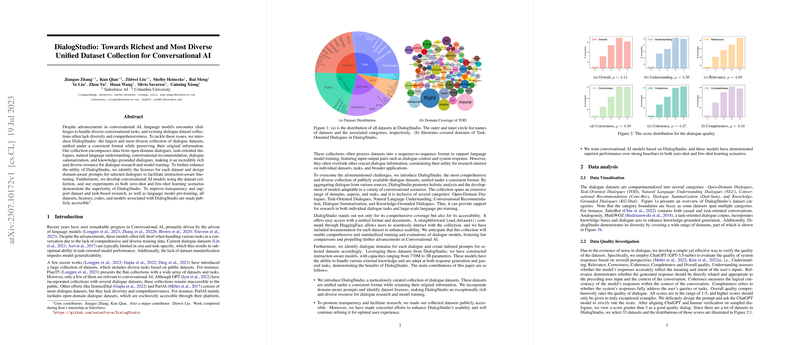Overview of DialogStudio: A Unified Dataset Collection for Conversational AI
The paper "DialogStudio: Towards Richest and Most Diverse Unified Dataset Collection for Conversational AI" introduces DialogStudio, a comprehensive collection of dialogue datasets intended to address the limitations of existing datasets in conversational AI. This paper is a pivotal resource for researchers aiming to enhance the capabilities of LLMs in handling a variety of conversational tasks.
Key Contributions
- Diverse Dataset Collection: DialogStudio aggregates over 80 dialogue datasets, spanning multiple dialogue categories including open-domain dialogues, task-oriented dialogues, natural language understanding, conversational recommendations, dialogue summarization, and knowledge-grounded dialogues. This extensive coverage promotes the development of models that can generalize across multiple conversational scenarios.
- Unified Format: A core contribution is the unification of datasets under a consistent format, preserving the original information and ensuring ease of use for training and evaluation. This leads to improved dataset accessibility and facilitates standardized training practices.
- Instruction Tuning and External Knowledge Integration: The authors design domain-aware prompts and incorporate external knowledge into dialogues, which enhances model fine-tuning processes. This approach improves the models' ability to utilize available external information, leading to more accurate and contextually aware response generation.
- Empirical Validation: Experiments demonstrate the effectiveness of DialogStudio in both zero-shot and few-shot scenarios. Models trained with this collection show superior performance when compared to strong baseline models, highlighting the potential of DialogStudio as a valuable resource in advancing conversational AI.
Data Analysis and Quality
The paper provides a thorough quality assessment of the datasets in DialogStudio, verified through a combination of automated and manual evaluations. This ensures that high-quality dialogue data is available for research, which is critical in training robust AI models.
Implications and Future Developments
DialogStudio is poised to significantly impact both practical and theoretical domains in AI research. Practically, the availability of a diverse and unified dataset collection allows for the development of more versatile conversational models. Theoretically, DialogStudio provides a platform for exploring new model architectures and learning paradigms, including instruction tuning and domain adaptation. The authors’ commitment to public accessibility and ongoing updates further supports long-term developments in conversational AI.
Conclusion
DialogStudio marks a substantial step forward in dataset aggregation for conversational AI research. By resolving issues related to dataset diversity, accessibility, and format standardization, this paper provides a foundation for future advancements and cross-domain applications in dialogue systems. Researchers are encouraged to leverage this resource in developing more competent and adaptive AI models.
